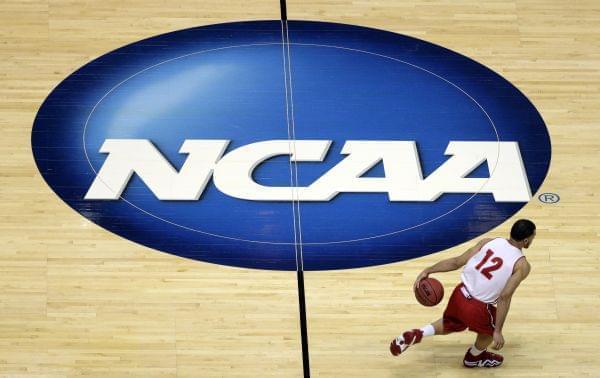UI Labor Prof: Appellate Ruling ‘Significant’ For NCAA

In this March 26, 2014, file photo, Wisconsin's Traevon Jackson dribbles past the NCAA logo during practice at the NCAA men's college basketball tournament in Anaheim, Calif Jae C. Hong/AP
A federal appellate panel has upheld a lower court ruling that the NCAA needs to provide full scholarships for student athletes, including meals and cellphone expenses. But the 9th Circuit Court of Appeals panel struck down another ruling requiring schools to pay athletes up to $5-thousand annually for the use of their name, likeness, or image.
University of Illinois Labor and Employment Relations Professor Michael LeRoy calls this part of the decision a ‘significant victory’ for the NCAA.
“And more significantly, the court has indicated that it is not appropriate for this court or other courts to figure out how exactly to pay these student athletes, it’s remanding that," he said. "The implication is the court might alter or bar some anti-competitive practices, but it’s not willing to tell the NCAA how to run its business.”
Wednesday’s ruling is the latest in the Ed O’Bannon case. In 2009, the former UCLA basketball player sued the NCAA for using his name and image on TV and in video games. LeRoy said even with the partial setback, the O’Bannon case has forced the NCAA to become more competitive in compensating athletes.
LeRoy said schools will vary in how much they will offer to cover the cost of attendance. He notes since the O'Bannon lawsuit was filed, there's been a 'proliferation' in the exploitation of player images.
"I have to say though, the NCAA and its member schools have taken a step back from some of the most excessive forms of exploitation," LeRoy said. "It's a lot harder now to get a football jersey with a particular student's number and name on the back."
Additionally, LeRoy said the NCAA is not taking video clips out of games, but it no longer allows video games to closely mimic the kind of player information formerly seen in those games.
NCAA President Mark Emmert issued an initial statement Wednesday: “We have not completely reviewed the court’s 73-page decision, but we agree with the court that the injunction ‘allowing students to be paid cash compensation of up to $5,000 per year was erroneous.’ Since Aug. 1, the NCAA has allowed member schools to provide up to full cost of attendance; however, we disagree that it should be mandated by the courts.”
Links
- U Of I Labor Prof Looks At Court Ruling Over NCAA Images
- U of I’s AD Thomas Weighs In On NCAA Autonomy Ruling
- NCAA Board Hands Big Ten, Other Power Conferences, More Autonomy
- NCAA Votes To Boost Student-Athletes’ Benefits, Big Schools’ Power
- U Of I Labor Prof: NCAA Settlement Over Concussions “Not Much”
- Further NCAA comments on O'Bannon case

